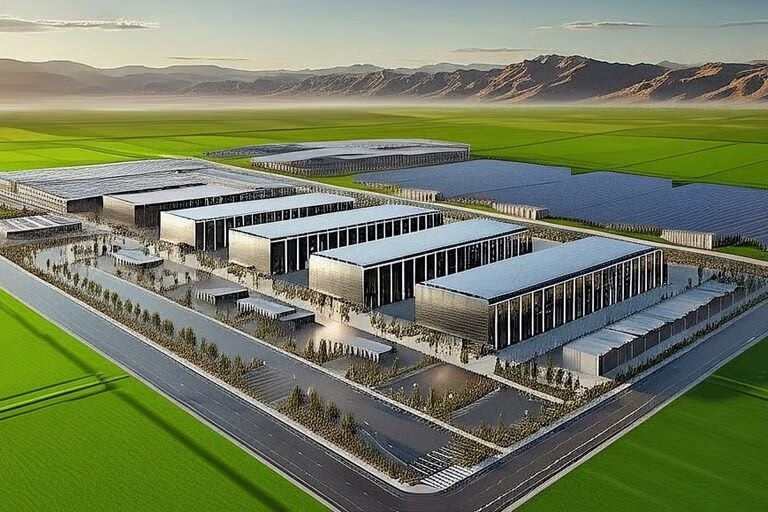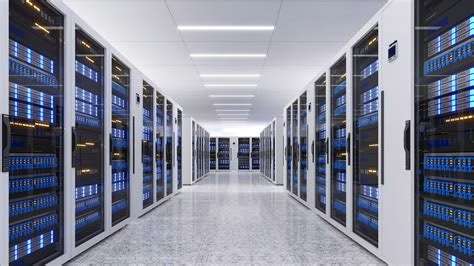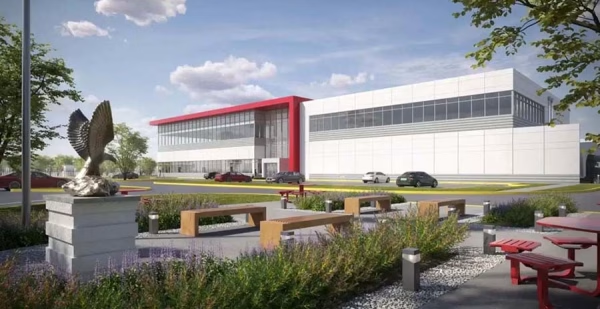The rapid expansion of cloud computing, artificial intelligence, and internet services has triggered a surge in demand for data centers across the United States and investments in them. These facilities, which store and process the digital information powering everything from social media to streaming, have become a strategic focus for both tech companies and local governments. As a result, U.S. states are increasingly engaged in fierce competition to attract multi-billion-dollar data center projects.
Why States Are Racing for Data Centers
Data centers bring significant economic value. Although they don’t always generate high employment numbers like factories, they offer substantial tax revenue, construction jobs, and long-term infrastructure investments. States are realizing that landing a data center means more than hosting servers—it means anchoring themselves in the future of digital commerce and communications.
To attract these investments, states are Competing for Data Center Investments by offering a combination of tax incentives, low-cost energy, and fast-track development approvals. Access to land, robust power grids, and fiber connectivity are crucial. Additionally, tech companies now prioritize renewable energy availability and sustainability regulations when choosing where to build.
Energy Capital Partners, the parent company of Calpine Corporation, has announced a groundbreaking $5 billion data center project at the York 2 Energy Center in southern York County. The project is set to make Pennsylvania a key hub in the nation’s AI and tech infrastructure boom with the data center set to join the ranks of the giga datacenters being planned around the country.This initiative is part of a sweeping $90 billion investment across Pennsylvania, aimed at expanding data center capacity, energy infrastructure, and workforce development to support the rapid rise of artificial intelligence technologies.
Virginia Sets the Benchmark
Virginia—especially Loudoun County—remains the country’s top data center destination. Often called “Data Center Alley,” it hosts the highest concentration of data centers globally. This leadership is thanks to a mature digital infrastructure, a business-friendly climate, and proximity to major network exchanges.
In Sterling County the PowerHouse Pacific Data Center is expected to be completed end of 2026 beginning of 2027. It will be a 265 MW and will consist of three buildings totalling roughly 1.2 million square feet, as well as a 2-acre power substation. Indicating that Loudoun County is nto teh only destination.
In August 2025 Google announced it would be investing $9 billion to expand its Virginia data centers, including a new Chesterfield County campus and expansions in Loudoun and Prince William counties. The project strengthens Virginia’s role as a global tech hub, adds advanced AI-ready infrastructure, and includes free AI training programs at local colleges to prepare the workforce for future digital opportunities.
However, as Virginia becomes saturated and competing for data Center investments intensifies, other states are seizing the opportunity to carve out their share of the market. LEts take a look at some of the major data center investments reporteda round the country.
Mitsubishi’s recent announcement that the Japanese company will be investing in data center campuses across the US, Virginia appears to have emerged on top with a 430MW data Center to be built in Loudoun County. This will be one of Mitsubishi’s campuses that will have a total capacity of 2.8GW. Other locations so far confirmed will be Illinois and Georgia.
Rising Challengers
Arkansas
Google’s $4 billion data center development dubbed Project Pyramid is a landmark investment in West Memphis, Arkansas. Approved by the Arkansas Public Service Commission on October 4, 2025, the project will be powered by a 600-MW solar facility and a 350-MW battery storage system developed with Entergy. Spanning nearly 1,200 acres, the campus will feature five data centers, office buildings, and advanced cloud and AI infrastructure. Google plans to integrate demand-response programs to reduce peak energy use, marking a first for its U.S. data centers. The initiative is projected to create thousands of jobs and boost local revenues.
Pennsylvania
In Pennsylvania CoreWeave has lined up $4 billion in funding toward its $6 billion AI data center campus planned for Lancaster, Pennsylvania, through a partnership with Blue Owl Capital, Chirisa Technology Parks (CTP), and Machine Investment Group (MIG). First announced during a White House event in July, the project will launch with 100 megawatts of capacity and could scale up to 300 MW as demand grows. Alongside its computing capabilities, the initiative includes about $200 million in upgrades to the local power grid. The campus is expected to support around 600 jobs during construction and create approximately 70 permanent operations roles, while also contributing to broader community benefits such as workforce training and education initiatives.
Texas
Texas is fast becoming a key player in the data center industry. Its deregulated energy market, expansive land, and fast-growing tech hubs like Austin and Dallas make it attractive for hyperscale builds. Arizona is another contender, offering a stable climate, strong solar energy resources, and aggressive tax incentives for data center developers. Recently Energy Capital Partners (ECP), a major private power and renewables owner in the U.S., together with global investment firm KKR, who unveiled the plans to build the 190 MW hyperscale data center campus in Bosque County, Texas. In West Texas Galaxy Digital Inc. has obtained a $1.4 billion project financing facility to fast-track the next phase of its Helios AI data center campus. Their strategy has 2.7 gigawatts of additional power capacity under review and the potential to scale up to 3.5 GW at full build-out. Once completed, it is expected to rank among the largest AI-focused data center campuses worldwide.
In another big win for Texas Vantage Data Centers in August 2025 unveiled its most ambitious project yet, “Frontier”—a $25 billion hyperscale campus planned for Shackelford County, Texas. Designed to deliver 1.4 gigawatts of capacity dedicated to artificial intelligence applications, the development marks the company’s largest undertaking globally and strengthens Texas’ role as an emerging hub for AI-focused digital infrastructure.
Also fot TExas is the announcement that Meta it is moving forward with a massive new artificial intelligence (AI) data center in El Paso, marks a $1.5 billion investment in the Texas border city.
Equinix, a global data-center operator, has announced plans for a new facility in West Dallas, backed by an estimated US $835 million investment. Construction is expected to start in February 2026 and wrap up by October 2027. The project represents one of the region’s largest commitments to data-center infrastructure, highlighting the rising demand for cloud, colocation, and interconnection services in the Dallas area.
Georgia
Georgia has passed laws offering sales tax exemptions for large data centers, while Iowa and North Carolina continue to attract giants like Microsoft and Apple with favorable land prices and energy options.
Arizona
Arizona-based Vermaland, LLC has announced plans for a massive $33 billion data center industrial park in Pinal County, strategically located between Phoenix and Tucson. Dubbed the La Osa Project, the development would cover 3,300 acres and deliver up to 3 gigawatts of power capacity. If realized, it could become the largest data center complex in the United States, positioning itself as a rival to Northern Virginia’s renowned “Data Center Alley.”
Utah
In Utah Joule in partnership with Caterpillar Inc. and Wheeler Machinery Co. have announced plans to build a Data Center Campus in Utah, which it aims to make the largest single campus in the state and among the most advanced data centers in the world. The Data Center will deliber 4.4GW of power capacity suppored by 1.1 GWh battery energy storage.

New Mexico
Doña Ana County, New Mexico, is weighing a transformative $165 billion proposal—Project Jupiter, a hyperscale AI data center campus in Santa Teresa. Led by Austin-based BorderPlex Digital Assets, the project would rank among the world’s largest data centers, creating at least 750 full-time jobs and generating $300 million in county payments over 30 years. County commissioners voted 4-1 to advance the deal, with a final decision due September 19. Financing would involve industrial revenue bonds, repaid by BorderPlex, ensuring no taxpayer liability.
Indiana
In a report released in September 2025 OpenAI is shifting its focus to the American heartland, with Indiana emerging as a potential location for a massive 1-gigawatt (GW) data center. The facility would form part of Project Stargate, a $500 billion mega-infrastructure initiative aimed at significantly expanding AI computing capacity across the United States—marking a clear move away from earlier speculation about overseas sites.
Mississippi
The state has entered the fray to win data center investment dollars and though a late entrant the state has secured a $6 billion Taurus Data Center Campus in Brandon that will be developed by AVAIO Digital Partners. The 329-acre campus is planned as a multi-phased project, with its first facilities being online in the first half of 2027.
Another entrant in the state is Amazon Web Services (AWS). The company will invest $3 billion to build a major data center campus in Vicksburg, Mississippi, making it the largest project in Warren County’s history. The facility, set to begin construction in 2026, will support generative AI, machine learning, and large-scale cloud operations. The project will create 200 permanent jobs and around 1,000 construction jobs, strengthening Mississippi’s emerging “Digital Delta” technology corridor. This investment follows AWS’s recent $10 billion development in Madison County, bringing its total commitment in the state to $13 billion. With upgraded power infrastructure and strong local support, Vicksburg is poised to become a key digital hub.
Wisconsin
Meta is developing a nearly US $1 billion data center on an 830-acre site in Beaver Dam, Wisconsin, revealed in state records as an US $837 million project under another name. While not officially confirmed, the scale strongly indicates Meta’s involvement. The facility will anchor Meta’s expansion of AI and cloud computing infrastructure, part of its projected US $65 billion 2025 capital plan.
Also in Wisconsin, QTS Data Centers is developing a $12 billion data center campus in DeForest and Vienna, backed by a $50 million community investment. The project will generate over 5,000 construction jobs, expand renewable-energy use through a partnership with Alliant Energy, and draw from 750 MW of clean power. Led by Tag Greason and David Robey, QTS is collaborating with Alliant Energy and local colleges to support training and research, with zoning approval expected in November 2025.
Microsoft are putting up a data center at Mount Pleasant while Vantage have broken ground on their Lighthouse Datacenter. All these mean that Wiscon is coming up strong with its favourable weather playing to its advantage.
Louisiana
Meta is moving ahead with a $10 billion hyperscale data center in Richland Parish, Louisiana, its largest U.S. investment of this kind to date. Spanning more than 1.25 million square feet, the facility will deliver high-capacity cloud and AI services while driving local jobs, tax revenue and infrastructure growth. To meet the center’s massive power demand, Entergy Louisiana has secured regulatory approval to build three combined-cycle gas plants, new transmission lines, and up to 1,500 MW of solar resources. The agreement accelerates Meta’s long-planned project and underscores Louisiana’s emergence as a competitive hub for next-generation data center development.
Antoerh major win for Louisiana is the establishment of the River Bend Data Center that is planned to eventually have a !Gw capacity, The first phase is to cover 254 Mw and is scheduled to be up and running by 2027
Oklahoma
Construction has begun on Project Clydesdale this November. The project is a $1 billion data center campus in Tulsa County by Beale Infrastructure, marking a major step in Oklahoma’s expanding digital economy. The 506-acre project will feature multiple data center buildings developed in phases
South Carolina
South Carolina is gaining momentum as a promising location for next-generation, nuclear-powered data centers, with the Savannah River Site (SRS) emerging as a focal point for industry interest. A growing number of major technology firms have expressed strong interest in developing AI-driven data center infrastructure on land managed by the U.S. Department of Energy (DOE).
This interest was evident during a recent industry engagement session held at the Savannah River Site, where the DOE invited proposals related to artificial intelligence data centers and supporting energy infrastructure. The meeting highlighted the federal government’s openness to repurposing portions of the site for advanced computing facilities powered by reliable, low-carbon nuclear energy.
Several leading U.S. technology companies participated in the discussions, including Microsoft, Google, and Meta, alongside data center and cloud infrastructure specialists such as CoreWeave, QTS, Oracle, Crusoe, Arus, Pegasus Group, Submer, and Pure Storage. Energy and nuclear technology firms were also well represented, with Bloom Energy and The Nuclear Company joined by Oppenheimer Energy, Deep Atomic, Oklo, and GE Vernova.
Together, the strong turnout underscores South Carolina’s growing appeal as a strategic hub for nuclear-enabled data centers, positioning the state at the intersection of clean energy, advanced computing, and long-term digital infrastructure development.
Big Tech Bets and Billion-Dollar Projects
In recent years, the scale of investment has grown dramatically. Meta (formerly Facebook) recently announced a $10 billion data center in Louisiana. Amazon Web Services is developing multi-campus data hubs in Indiana and Mississippi. In addition the company is also expanding its data center infrastructure in Richmond County North Carolina at a cost of $10 billion as well. Microsoft has ramped up construction across the Midwest and Southeast, particularly in Wisconsin and North Carolina. Google has also committed $10 billion towards a data center campus in West Memphis, Arkansas
Each of these projects represents more than just infrastructure—they signal long-term commitments by tech giants to specific regions. And with the rise of AI and edge computing, more facilities will be needed in decentralized locations spuring competition for data Center investments.
Some of the Billion dollar Data center projects planned in the USA
- Google US $4 Billion Data Center Campus in West Memphis, Arkansas
- Google US$2 billion Fort Wayne Data Centre
- Meta US $10B AI Data Center in Richland Parish, Louisiana
- Amazon US $20B in Expansion of its Data Centers and AI Infrastructure in Pennsylvania
- Amazon US $11B Investment for New Data Center in Indiana
- $5 billion data center project at the York 2 Energy Center in southern York County in Pennsylvania
The Future of the Race
As demand grows, competition will intensify. States that can offer not only tax advantages but also renewable energy, reliable water supply, and workforce readiness will stand out. Data centers are no longer niche industrial facilities—they are the backbone of our digital lives. The states that win this race today could become the digital capitals of tomorrow.
But its not all roses
Despite initla enthusiasim there is an emerging reassessment from communities who feel that the job opportunites are too few given the huge investments. For instance an investment of US$10billion though offering thousands of jobs during construction, once operations begin the centers offer as little as 500 jobs. In addition their energy needs to power up the data centers can be similar to that of a small city putting immense pressure on the grid. While cooling the plants also causes major challenges. Recently Amazon reportedly cancelled plans to put up a data center in Becker Minnesota after legislative changes rolled back tax incentives previously granted to data center development. These have caused some data centers to be delayed or cancelled altogether.


Leave a Reply